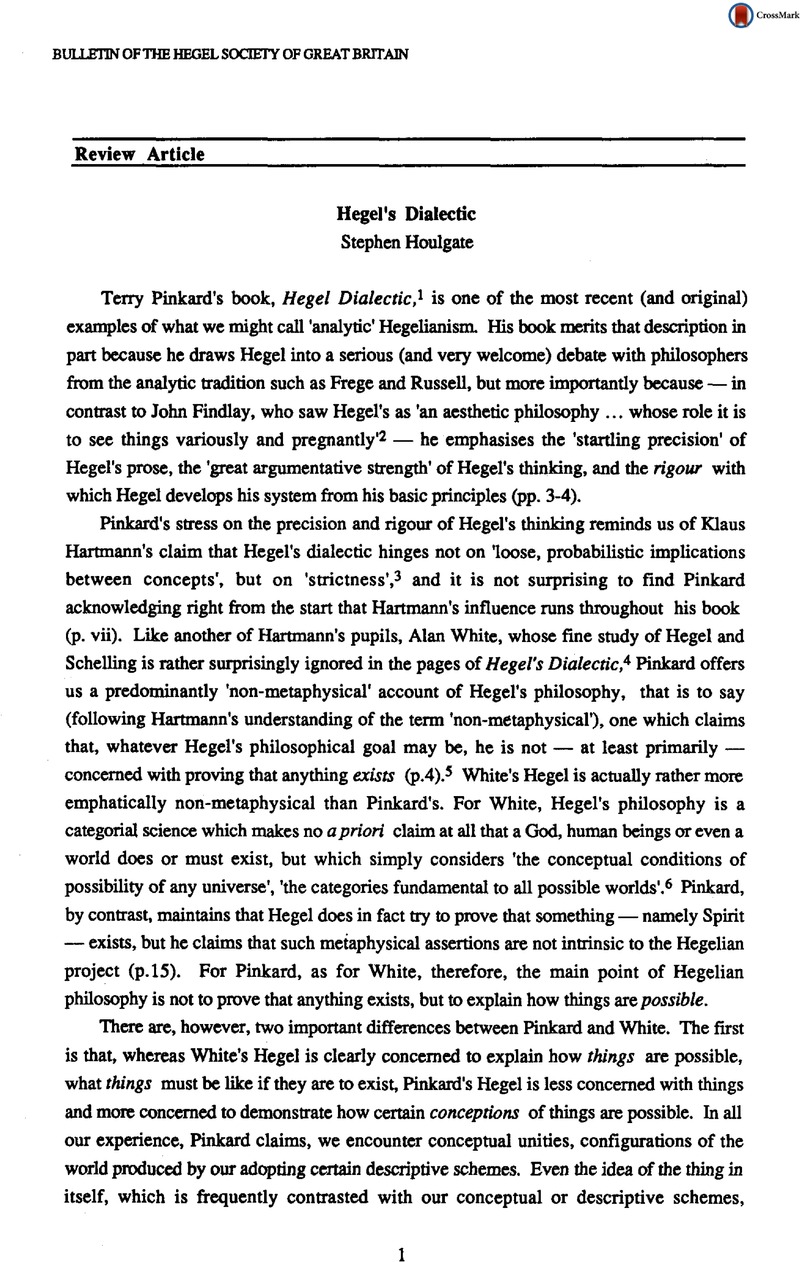No CrossRef data available.

1 Pinkard, Terry, Hegel's Dialectic. The Explanation of Possibility, Philadelphia, Temple University Press, 1988 Google Scholar. Unless otherwise indicated, all references in the text are to Pinkard's book.
2 Findlay, J. N., Hegel. A Re-examination, New York, Oxford University Press, p. 341 Google Scholar.
3 Hartmann, Klaus, ‘Hegel: A Non-Metaphysical View’, in Macintyre, Alasdair ed, Hegel: A Collection of Critical Essays, Garden City, Anchor Books, 1972, p. 102 Google Scholar.
4 White, Alan, Absolute Knowledge: Hegel and the Problem of Metaphysics, Athens, Ohio, Ohio University Press, 1983 Google Scholar. See also my review of White's, book in the Bulletin, 9 (Spring/Summer 1984), 36–41 Google Scholar.
5 For a somewhat different understanding of what it means for Hegel to be understood as a non-metaphysical philosopher, see my Hegel Nietzsche and the Criticism of Metaphysics, Cambridge, Cambridge University Press, 1986, especially chapters four and fiveGoogle Scholar.
6 White, pp 86-7.
7 See White, op. cit.; Pippin, Robert, Hegel's Idealism. The Satisfactions of Self-Consciousness, Cambridge, Cambridge University Press, 1989 CrossRefGoogle Scholar; Harris, Errol, Formal, Transcendental and Dialectical Thinking: Logic and Reality, Albany, SUNY Press, 1987 Google Scholar; Winfield, Richard, Reason and Justice, Albany, SUNY Press, 1988 Google Scholar, and Overcoming Foundations, Studies in Systematic Philosophy, New York, Columbia University Press, 1989 Google Scholar.
8 White, p. 37.
9 White, pp 57-8.
10 White, p. 63.
11 Winfield, , Reason and Justice, p. 142 Google Scholar.
12 Hegel's Science of Logic, translated by Miller, A. V., Atlantic Highlands, NJ, Humanities Press International, 1989, p. 49 Google Scholar.
13 See my ‘Thought and Being in Kant and Hegel’, forthcoming in The Owl of Minerva. Biannual Journal of the Hegel Society of America.
14 Kolb, David, The Critique of Pure Modernity. Hegel, Heidegger, and After, Chicago, University of Chicago Press, 1986, p. 43 Google Scholar.
15 On the critical implications of Hegel's theory of the judgement and the speculative sentence, see my Hegel, Nietzsche and the Criticism of Metaphysics, chapters five and six.
16 Hegel's Logic. Being Part One of the Encyclopaedia of the Philosophical Sciences (1830) translated by Wallace, W., with Foreword by Findlay, J. N., Oxford, Clarendon Press, 1975, p. 129 Google Scholar. For the German, see Hegel, G.W.F., Werke in zwanzig Bänden, edited by Moldenhauer, E. and Michel, K., Frankfurt, Suhrkamp Verlag, 1970, Vol. 8, p. 188 Google Scholar.
17 Kolb, p. 86.
18 Hegel's Science of Logic, translated by Miller, A. V., p. 481 Google Scholar.
19 Hegel's Science of Logic, translated by Miller, A. V., p. 115 Google Scholar.
20 Hegel, G. W. F., Werke in zwanzig Bänden. Vol. 5, p. 123 Google Scholar.
21 Hegel's Science of Logic, translated by A. V. Miller, p. 815.